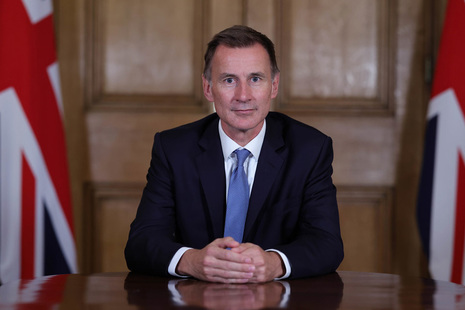Chancellor Jeremy Hunt has disclosed the details of his Autumn Statement, delineating the government’s fiscal policies and expenditures for the upcoming year.
An additional £500 million has been allocated to support the advancement of the next generation of  supercomputers in the UK, building upon successful initiatives such as the one in Bristol. Chancellor Jeremy Hunt outlined 110 measures aimed at fostering economic growth and addressing regional disparities in a cautiously optimistic Autumn Statement. He emphasized that these proposals would stimulate investment, reduce debt, but underscored that there is more work to be done.
supercomputers in the UK, building upon successful initiatives such as the one in Bristol. Chancellor Jeremy Hunt outlined 110 measures aimed at fostering economic growth and addressing regional disparities in a cautiously optimistic Autumn Statement. He emphasized that these proposals would stimulate investment, reduce debt, but underscored that there is more work to be done.
Among the measures is a focus on expanding successful supercomputer programs in Edinburgh and Bristol. Bristol has been selected to host a new national supercomputer research facility with a focus on artificial intelligence (AI). Chancellor Hunt expressed the importance of ensuring that universities, scientists, and startups have access to the computational power they require. Consequently, a £500 million commitment has been made to support the “next generation of supercomputers and AI innovation” over the next two years.
In addition to advancements in technology, the Autumn Statement addressed economic measures, including a freeze on alcohol duty until 2024, benefiting the hospitality sector. This freeze results in a 3p reduction in the duty cost of an average pint of beer, providing financial relief to pubs and the alcohol industry.
The Office for Budget Responsibility (OBR) presented optimistic economic forecasts, predicting growth in the UK economy for the next five years. Debt as a proportion of GDP is expected to decline from 2027-2028. GDP growth is forecasted at 1.4% in 2024, 1.4% in 2025, 2% in 2026, 2% in 2027, and 1.7% in 2028.
Key pledges include leveling-up measures, such as the establishment of new Investment Zones in the West Midlands, East Midlands, and Greater Manchester. These zones are anticipated to attract £3 billion in private investment and support the creation of 65,000 jobs. Additionally, the UK manufacturing sector is set to receive £4.45 billion in support to facilitate investment and drive the transition to Net Zero.
Chancellor Hunt emphasized that this funding aims to level up communities with higher-paid jobs, enhance energy security, and foster growth in future sectors. The Autumn Statement also confirmed the permanence of the full expensing allowance, introduced in the Spring Budget 2023, providing 100% first-year relief to companies on qualifying new main rate plant and machinery investments.
Jeremy Hunt says the government will deliver a plan to tackle the cost of living crisis and rebuild the UK economy. The chancellor says his priorities are stability, growth and public services, and is providing “fair solutions” despite taking “difficult decisions”.
Here below is a summary of the main measures. You can read the full speech here.
Taxation and wages
- Main rate of National Insurance cut from 12% to 10% from 6 January, affecting 27 million people
- Class 2 National Insurance – paid by self-employed people earning more than £12,570 – abolished from April
- Class 4 National Insurance for self employed – paid on profits between £12,570 and £50,270 – cut from 9% to 8% from April
- Legal minimum wage – known officially as the National Living Wage – to increase from £10.42 to £11.44 an hour from April
- New rate to apply to 21 and 22-year-old workers for the first time, rather than just those 23 and over
Benefits and pensions
- Universal Credit and other working-age benefits in England and Wales to increase by 6.7% from April, in line with September’s inflation rate
- Local Housing Allowance rates – which determine the level of housing benefit and Universal Credit people receive to pay rent in Great Britain – to be unfrozen and increased to 30% of local rents
- Work Capability Assessment to be reformed to reflect availability of home working after Covid pandemic
- Funding of £1.3bn over the next five years to help people with health conditions find jobs
- Further £1.3bn to help people who have been unemployed for over a year
- Claimants in England and Wales deemed able to work but who refuse to seek employment to lose access to their benefits and extras like free prescriptions
- State pension payments to increase by 8.5% from April, in line with average earnings
- Consultation on whether savers get the right to pick the pension scheme their employer pays into – possibly allowing them to have one pension pot for life
Economy and public finances
- Chancellor’s package includes 110 measures aimed at boosting economic growth
- The independent Office for Budget Responsibility (OBR) expects the economy to grow by 0.6% this year and 0.7% next year, rising to 1.4% in 2025; then 1.9% in 2026; 2% in 2027 and 1.7% in 2028
- It forecasts that headline inflation – the rate prices are rising – will fall to 2.8% by the end of 2024 and to the Bank of England’s 2% target rate in 2025
- Underlying debt forecast to be 91.6% of GDP next year; 92.7% in 2024-25; 93.2% in 2026-27; before declining to 92.8% in 2028-29
- Borrowing forecast to fall from 4.5% of GDP in 2023-24; to 3% in 2024-25; 2.7% in 2025-26; 2.3% in 2026-27; 1.6% in 2027-28 and 1.1% in 2028-29
Business and infrastructure
- “Full expensing” tax break – allowing companies to deduct spending on new machinery and equipment from profits – made permanent
- The 75% business rates discount for retail, hospitality and leisure firms in England extended for another year
- Households living close to new pylons and transmission infrastructure to get up to £1,000 a year off energy bills for a decade
- Funding of £4.5bn to attract investment to strategic manufacturing sectors, including green energy, aerospace, life sciences and zero-emission vehicles
- Some £500m over the next two years to fund artificial intelligence innovation centres
- Financial incentives for investment zones and tax reliefs for freeports extended from five years to 10 years, with new investment zones announced for the West Midlands, East Midlands and Greater Manchester, as well as Wrexham and Flintshire
Other measures
- All alcohol duty frozen until 1 August next year
- Duty rate on tobacco products increases by 2% above RPI inflation; hand-rolling tobacco rise 12% above RPI
- Fuel duty wasn’t mentioned so remains 52.95p per litre for petrol and diesel, after the chancellor announced a 5p per litre cut for 12 months in March
- Up to £7m over next three years for organisations like the Holocaust Educational Trust to tackle antisemitism in schools and universities
- Funding of £5m for Imperial College and Imperial College Healthcare NHS Trust to set up Fleming Centre to work on health innovations



